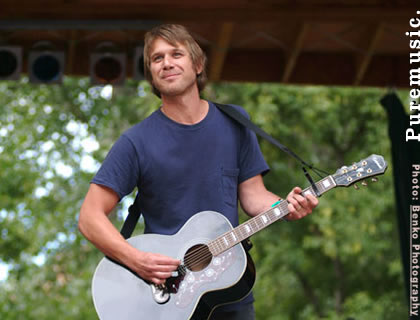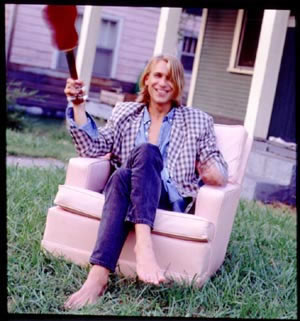
A Conversation with Todd Snider
Puremusic: Hello, Todd, Frank here. How you doing, man?
Todd Snider: I'm doing good. Thank you for calling me.
PM: Oh, yeah. It's my pleasure. It's finally a beautiful day here in Nashville and not so super super cold today.
TS: I'm in San Antonio--well, no, I'm in Dallas.
PM: What have you got down there for weather, is it nice?
TS: It's all right. It's actually kind of cold, though, and overcast. Not rainy or nothing, but it's cold. We're just sitting up here in--we're sitting inside. It's nice in Nashville?
PM: It's nice today. It's beautiful and clear, and it's not down in the teens. I think it got up to the 40s, today, so it's pretty good, yeah.
TS: Oh, nice.
PM: You got a good audience down in San Antonio, I'll bet.
TS: Yeah, we had a great night last night. We played Floore's Country Store. And I don't think we filled it up, but it was pretty god dang full.
PM: That's beautiful. Who's out on tour with you at the moment?
TS: Just me and my wife, and my tour manager, and myself.
PM: Wow. And did anybody good open?
TS: Hayes Carll did the show last night with us. And Robert Earl Keen came out during my set and sang on a song.
PM: Wow. That's a nice thing about playing Texas. I sure do like Hayes Carll, too. He's a really funny dude.
TS: Oh, I love him. I love that guy.
PM: I'd like to confess that at first I was one of the people out there that was saying, "Will somebody please explain to me what the hubbub about Todd Snider is, I don't think I quite get it." But in more recent years, and especially after listening a whole lot to East Nashville Skyline and now The Devil You Know, I totally, totally got it, and I'm sorry. And I'm never going to shut the hell up about it now.
TS: Oh, thank you, man. That makes me feel good.
PM: So even though I've read a little about it before, I'd like to hear it from you, about the kind of a home and a family you grew up in, and how music first took a hold you of in your life.

TS: Well, my dad was into music, but he wasn't into me being into music. In my house when I was a kid, when I was real young, my dad wanted us all to play sports, and we were jock-like. We had a lot of money. And my brother was sort of the light of our family, and he was a good athlete. And I wasn't a very good athlete, but I tried to be. And then when I was 15 my dad went bankrupt, and we moved to Houston. And I went with him, but then I went back to Portland.
My dad was going to go out to Portland for some business, and I rode out there with him and said I was going to see some friends. And then when I got there, I wouldn't go back. And so I stayed at this guy's house--I stayed with about a big handful of--my friends' parents would let me stay on their couches there for I think it was my junior and senior year in high school. So then music, I think, really got me--the first I remember realizing that music really was important to me I think was--well, two records. There was a guy next door who brought over Led Zeppelin's first record, that one with "Stairway to Heaven" on it.
PM: Sure. [It's actually on Led Zeppelin IV, though the debut was full of other amazing songs.]
TS: And then there was this other guy in college that my dad brought into our house because he thought he'd make us like sports more. It was like one of the neighbor guys--he was like, "This guy is a football player." And he'd come over and play Lynyrd Skynyrd for us. And that was really what I got from him. And then my dad loved Creedence Clearwater. Those were like my first three, I guess. But my dad thought it was kind of faggy to like music, so that was a bit of an odd thing, until I got out of my house, which I guess is my junior year in high school, then I started to become a music nut. After school was over, I didn't know where to go. And this guy named Rob was going to go to junior college in Santa Rosa, and my uncle lent me some money to go. So I went down there with him. But I didn't end up doing that. When I got there, I didn't go sign up or nothing. I just started hanging around the area.
PM: Really? That's an old stomping ground of mine, Santa Rosa and Sonoma, and around there, yeah.
TS: Really? Yeah, what's that street, Mendocino.
PM: Yeah.
TS: And so when I got there, I just remember everything sort of fell apart. The sofa circuit wasn't as kind after a while. And so I remember I had a moment when I was like being evicted--being asked to leave-- I was on the roof of this apartment building, and the police came. And somebody called and said I had to go. And I remember as I was getting dragged off--not dragged, but told to come down off the roof, thinking--I had this moment in my life where I was like--there's nothing I'm going to do. I don't have no dad to work for, there ain't no college I can go to. Nothing--what am I going to do? And I remember in that moment I thought, I'm going to try to be a singer. Why not? I can say I'm any fuckin' thing I wanted to from here.
PM: Wow.
TS: And so then like the next day, I called my brother. He sent me a ticket to go to Austin, where he was working construction. And I told him I was going to join a band. He was like, "What do you mean, you're going to join a band?"
PM: [laughs]
TS: I said, "I got all these lyrics and everything." And he was like, "You're kidding me." And I was like, "Yep." And so he said, "Well come on down here, there's all these bands, Austin is full of bands. Come on, and I'll get you a job in construction."
And so I went with him. It took me two days to get from Santa Rosa to San Francisco. So I got there, and I got a ticket. I had to give my records away at the airport--well, not my records, my clothes, I kept my records. I went to Austin, got there. My brother was in San Marcos, which was like thirteen miles outside of town.
I eventually got a job at this restaurant, Peppers, at The Falls. But I had the job like a real short time. It was all in like a three-month period. I got the job, busboy. And then my friend played me a Jerry Jeff Walker record, and I got obsessed with that. And then I went and saw him, and he was alone. Then I changed gears completely. I saw this show, and it changed my whole life. I was like, "Now I'm a folksinger, and I don't even know what that means yet, but I'm going to find out tomorrow." And then I went and the next day I said, "I'm going to get an acoustic guitar." At the time I wanted to be somebody's lead singer. But I saw Jerry Jeff, and I went "Nope, new plan."
PM: Wow.
TS: And I went and got a guitar, and I started making up songs. And my first song was about being a busboy. And I ended up playing at the place where I was a busboy.
PM: Wow.
TS: Then I just kept making up songs. And by the end of that summer I had like thirteen songs. And I quit my job as the busboy, and became the singer in the bar, at the same bar. And the owner of the bar was like, "Love it!" And then I'd just play a few songs, and they'd say, "Don't do that! That's crap!"
[laughter]
TS: I'd go, "Here's a Jim Croce song." And they'd be like, "You don't play well enough to do Jim Croce's songs. Just do your own songs!" I only knew like--at my first gig I knew a couple of chords at my first gig.
PM: Damn! And what was that song about the busboy called?
TS: It was called "Bus Tub Stew."
PM: [laughs]
TS: And I can remember it. Everett Falls was the restaurant. And it was a true story, in fact, because I would eat the people's leftovers. If somebody didn't really touch their food, I'd think, "I'll eat that."
[laughter]
TS: And if they only took about a bite or two--I know it sounds gross, but at least it's food.
[laughter]
PM: That's unbelievable--so it's a totally organic story, how one thing led to the other. I mean, it's not some big fantastical thing. It's like, this fell into place, then I did this and, change of plan, I did that. It's amazing how organic that story is.
TS: Oh, well, thank you, man. continue
print
(pdf) listen to clips
puremusic home